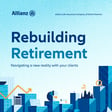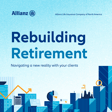
Episode 1.09 Ludovic Subran on volatility and market risk
Ludovic Subran is the Chief Economist of Allianz SE and Allianz Trade (formerly Euler Hermes). He’s also worked for the World Bank, the United Nations World Food Program, and the French Ministry of Finance. And he’s co-authored three books on markets and economics.
Ludovic talks about why our perception of market volatility has changed from that of previous generations, the complexity of global market information, and the need for greater financial literacy.
Subscribe to Ludonomics on LinkedIn
See more retirement risk management insights from Allianz
...
Allianz Life Insurance Company of North America (Allianz) and Allianz Life Financial Services, LLC are not affiliated with our podcast guests or their companies. Any links to the podcast guest's website are being provided as a service to you. Opinions expressed by the podcast guests are not necessarily those of Allianz or its affiliates. Please note that the information and opinions are provided by third parties and sources believed to be reliable, but accuracy and completeness cannot be guaranteed. The information is not intended to be used as the sole basis for financial decisions, nor should it be construed as advice designed to meet the particular needs of an individual’s situation.
Allianz Life Insurance Company of North America has been keeping its promises since 1896 by helping Americans achieve their retirement income and protection goals with a variety of annuity and life insurance products.
Allianz Life Insurance Company of North America (Allianz) does not provide financial planning services.
Diversification does not ensure a profit or protect against loss.
This content is for general educational purposes only. It is not intended to provide fiduciary, tax, or legal advice and cannot be used to avoid tax penalties; nor is it intended to market, promote, or recommend any tax plan or arrangement. Allianz Life Insurance Company of North America, its affiliates, and their employees and representatives do not give legal or tax advice or advice related to Social Security or Medicare. Customers are encouraged to consult with their own legal, tax, and financial professionals for specific advice or product recommendations, or the Social Security Administration (SSA) office for their particular situation.
Guarantees are backed by the financial strength and claims-paying ability of Allianz Life Insurance Company of North America. Registered index-linked annuity

